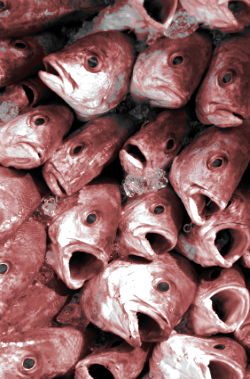Fish to feel oxygen pinch
 The level of oxygen in the oceans is dropping, threatening the habitat, behaviour and viability of fish stocks.
The level of oxygen in the oceans is dropping, threatening the habitat, behaviour and viability of fish stocks.
A new study has found oceanic oxygen levels have fallen by 2 per cent in the past 50 years.
Experts analysed a wide-ranging set of data from 1960 to 2010 to document changes in oxygen distribution across vast areas of ocean.
“Since large fish in particular avoid or do not survive in areas with low oxygen content, these changes can have far-reaching biological consequences,” said Dr Sunke Schmidtko, the report’s lead author.
The Pacific Ocean has suffered the greatest volume of oxygen loss, while the Arctic saw the sharpest percentage decline.
“While the slight decrease of oxygen in the atmosphere is currently considered non-critical, the oxygen losses in the ocean can have far-reaching consequences because of the uneven distribution,” said Lothar Stramma, another of the report’s authors.
The report is further evidence that the planet’s oceans shoulder the heaviest burden of climate change, as they absorb more than 30 per cent of the carbon produced on land.
Oceans become more acidic as the carbon they absorb causes PH levels to drop, which means that any creatures who build their shells from calcium in the environment struggle to do so.
Warming waters also cause reproductive issues in cod and other species, triggering new migration patterns as they seek colder climates.
As the oxygen drops, experts expect animals will be forced to seek out ever-shrinking patches of habitable water.
While scientists have predicted ocean deoxygenation due to climate change, seeing the true scale of it globally, and at deep sea level, is concerning.
The report shows oceanic oxygen supply is threatened by global warming in two key ways.
First, as oceans warm, oxygen is reduced because warmer water is less able to contain oxygen than cold.
Secondly, warmer water is less dense, so oxygen-rich waters near the surface cannot easily sink and circulate.
As the world warms, the oceans’ surfaces become thicker and warmer, acting like a lid stopping oxygen from being transported down below.
The flow-on effects for wildlife could be severe, with fish that rely on dissolved oxygen growing smaller and producing fewer offspring.
Additionally, large fish such as tuna, swordfish and sharks depend on larger amounts of oxygen, and so could be driven into increasingly narrow bands of oxygen-rich water near the surface, adding more competition for food sources and increasing the chance they will be caught.








 Print
Print